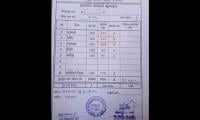Gambit on the Devil’s Chessboard by debutant novelist Imran H Khan, a professor at the School of Medicine, University of California, was launched at a hotel in Karachi on Saturday.
Speaking at the launch ceremony, Pakistan Peoples Party (PPP) Senator Raza Rabbani said that though the book had been written abroad, it was a breath of fresh air in the circumstances that we find ourselves in.
“Khan may have penned a fictional novel, but I personally believe it is a fictional reality because of the parallels he has drawn with the real world,” he opined, adding that there was a great deal of similarity between this fictional reality and his two books – The Smile Snatchers and Invisible People – because the situation and characters were real and only their names were fictitious.
The senator said the book portrays goody goody Western capitalists looking for an opportunity to help the downtrodden and oppressed people of the damned Third World countries only to exploit them and their natural resources. “It is a new form of neocolonialism whereby resources of developing and Third World countries are exploited and used by Western imperialists,” he added.
He said corporate businesses’ designs are best suited to dictatorships, particularly military ones, because they act as a one- window operation that goes a long way in facilitating their aims and objectives, but on the other hand democracy with all its shortcomings has many institutions and legal hurdles to be crossed.
Rabbani said the book talks about big businesses and corporate world, but what we see today is that the domination of smaller countries is sought through donor agencies and international financial institutions such as the World Bank and International Monetary Fund by causing destabilisation within these countries.
He lamented that the “coffee culture” that generated ideas, thesis and counter thesis as well as intellectuals was done away with in Pakistan by the state. “The Zia regime was at the forefront to bring an end to such a culture. As a result, there exists no academic freedom in Pakistan now and dissent is something which is not to be tolerated,” he maintained, adding that it was the reason we are unable to produce the likes of Jaun Elia, Habib Jalib and Raees Amrohvi.
Former senator Javed Jabbar said the book was an unusual phenomenon because it had been authored by the Pakistani diaspora. “We sent abroad a doctor and suddenly found that an author is born,” he said in a lighter vein. “I am not complaining but it was a pleasant surprise that we sent doctors abroad and get authors in return. What will happen if we export authors and get doctors in return because we desperately need the latter at the same time.”
Lauding Khan, he said that the author had been studying important infectious diseases and tuberculosis and found time to pen a book. “Mostly people become the prisoners of their disciplines and it is good to become a specialist in your discipline, but to keep that despciline and venture into a completely different discipline takes a lot courage and determination.”
Jabbar said Khan has joined a very exceptional cadre of gifted Pakistani authors. “Most novels tend to move at a speed of about 70-80 miles per hour, but this novel starts at 140 miles per hour and never slows down, keeps going and gathers speed,” he said. “This book is a pictorial novel without pictures. It is not a comic book novel though it could easily be converted into one because it is so full of dialogue that carries you along. Its language is austere, very precise. It is very, very neat and perhaps too neat. There is no time to explore nuances.”
He said the story has an imaginative plot and is full of intricate twists and turns as readers do not realise what is going to happen next.
Shedding light on his journey of becoming a novelist, the author said he had to take a six-month class with 21-Time New York Times bestselling author Jerry B Jenkins to understand what fiction writing was, especially a thriller.
“The hero of my story is modelled on a medical student I had. I was really fascinated by the fact that the guy was actually an ex-Navy Seal, which is a big deal, as out of hundreds of people in a batch, only a handful can actually graduate. It is such a tough and grueling task with a lot of different aspects of the training. My villain is composite of several sorts of dictators in developing and underdeveloped countries,” he explained.
He said developing and underdeveloped countries shouldn’t look towards world powers for solutions of their problems, but instead they should find ways to solve them themselves. He pointed out that in Pakistan, people were having more children because they considered them “added earning hands”, which was very unfortunate. With a growing population, people are desperately clearing forests to make fields available to grow more crops, and as people go into wilderness where humans are not used to living, their immune system does not evolve to fight those germs, and as a result pandemics like Covid are going to happen again.
Ameena Saiyid said she started off the book thinking she would complete it in ten days but she finished it in three days. “The book is not only fast-paced and action packed, it is so grounded in reality that it resonates with the reader,” she added.
Veteran journalist Muhammad Ali Siddiqi said a successful writer is one who can create an ambiance for readers and that is exactly the writer has done in his “wonderful and mistake-free” book.
Dr Huma Baqai, Professor Kaleem Raza Khan and Prof Abid Azhar also spoke at the event.
An aerial view of Karachi city. — AFP/FileDastangoiT2F is hosting the Dastango group, who aim to mesmerise you with...
A representational image of a healthcare person setting up a syringe to get the blood from a patient. —...
In this image, Pakistani pilgrims wait in line as they prepare to board a PIA special Haj pilgrimage flight bound for...
University of London in the UK. — Scholarship-positions/FileThe achievements of its students in Pakistan are being...
This representational image shows an unidentified individual holding a graduation cap. — Unsplash/FileThe Shaheed...
Sindh police chief Ghulam Nabi Memon presides over a meeting at the CPO on March 30, 2024. — Facebook/Sindh...







